Redditor Wants Her Roommate's Dog Gone Because She Is Tired Of Cleaning After It And Its Owner’s Complete Lack Of Responsibility
Dogs are great, and they make our lives better in so many ways. But there's one thing you should never do: use your dog as a way to get your roommates to do things for you.
Believe me, it won't work. Your roommates are not going to be magically compelled to take care of your dog just because he or she is there.
Chances are good that your roommates will start resenting both you and your dog if you try this approach. So don't do it!
Don't be the crappy roommate. Take ownership of your furry friend and give them the proper care they deserve.
In a recent post over at the "Am I The A**hole?" (AITA) subreddit, a user was fed up with her roommate's lack of responsibility. According to the original poster (OP), her roommate's parents are getting a divorce.
So this roommate's family decided that she would take care of the dog. The OP didn't want a dog in their place but ultimately decided on a compromise by having a trial period with the dog.
Things did not go well, as the dog is blind and barks non-stop. The OP and the other roommate aren't getting enough sleep because of it.
She even had to clean up the messes that the dog left in parts of their home. Now, the OP wants her roommate to get rid of the dog.
Three friends decided to rent a place.

The OP and her roommate have cats that aren't making any mess in the apartment.

The problem is, the other roommate has to take care of their family dog because her parents are getting a divorce.
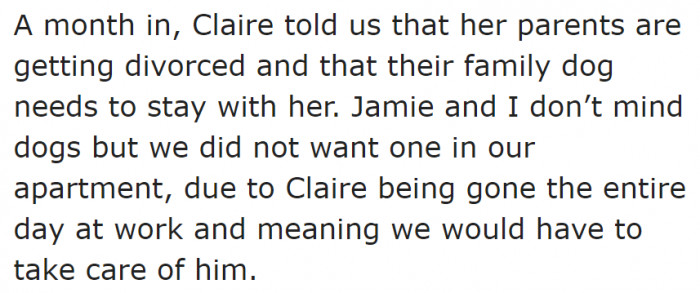
The Dynamics of Shared Living Spaces
Dr. Janet Moore, a social psychologist at the University of Michigan, explains that shared living arrangements often lead to interpersonal conflicts due to differing expectations and responsibilities.
Her research indicates that these conflicts can escalate when one party perceives the other as irresponsible or neglectful, especially regarding pets.
This creates an environment of resentment that can significantly strain relationships.
Understanding the Dynamics of Responsibility
The Redditor's frustration with her roommate's lack of responsibility for the dog highlights the complexities of shared living situations. Research in social psychology indicates that shared responsibilities can lead to tension when one party perceives the other as unreliable. This sense of unfairness can create a breeding ground for resentment and conflict. According to a study published in the Journal of Personality and Social Psychology, perceptions of fairness in shared responsibilities are essential for maintaining positive relationships in communal living.
It's crucial for roommates to have clear agreements to avoid misunderstandings and foster a sense of accountability.
Since the OP isn't comfortable with allowing a dog to live with them, she had to draw the line from the beginning.
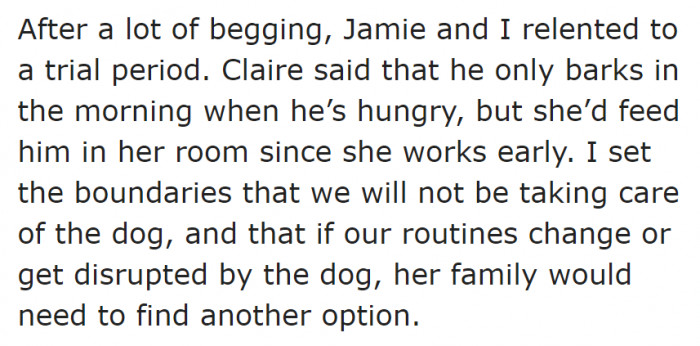
The roommate's dog is disrupting the peace at home.
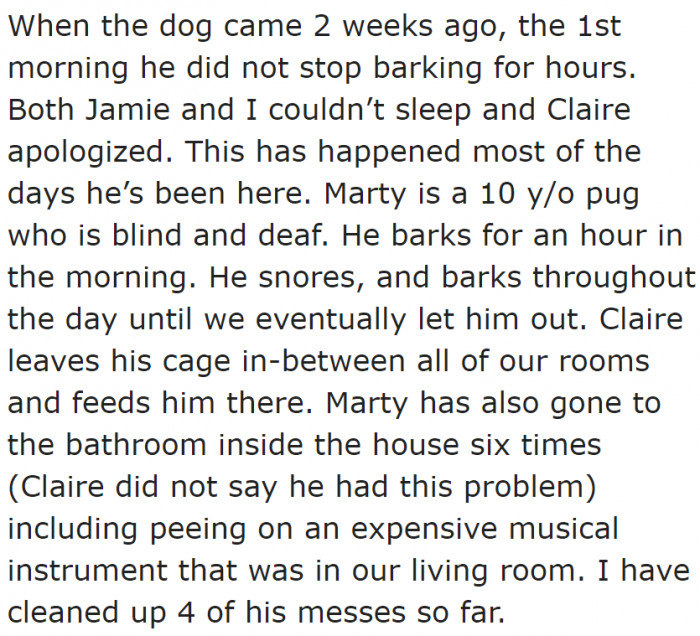
The OP had to clean up the mess made by the dog.
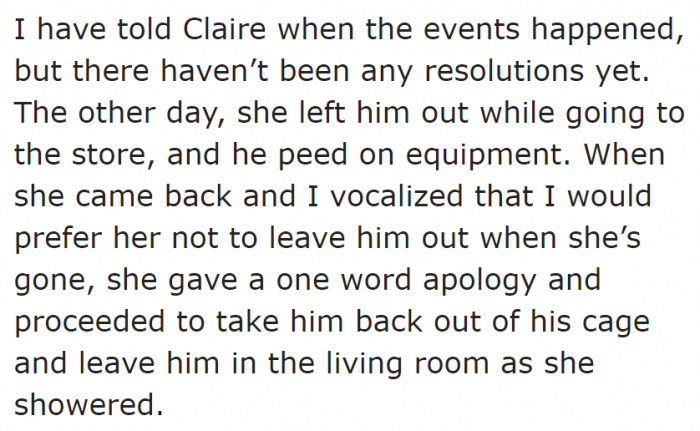
Behavioral studies show that when individuals feel their personal space or belongings are being compromised, they may react defensively, leading to hostile exchanges.
Such reactions are often rooted in a desire to regain control over their environment, which can exacerbate tensions among roommates.
Moreover, the concept of cognitive dissonance may play a role in the roommate's behavior. Cognitive dissonance occurs when a person's actions are inconsistent with their beliefs or values, leading to discomfort. Research suggests that individuals may rationalize their behavior to alleviate this discomfort, which could explain the roommate's reluctance to take responsibility for her dog's care. Understanding this psychological phenomenon can provide insight into why she may not see her neglect as problematic.
The OP and her roommate got into an argument.
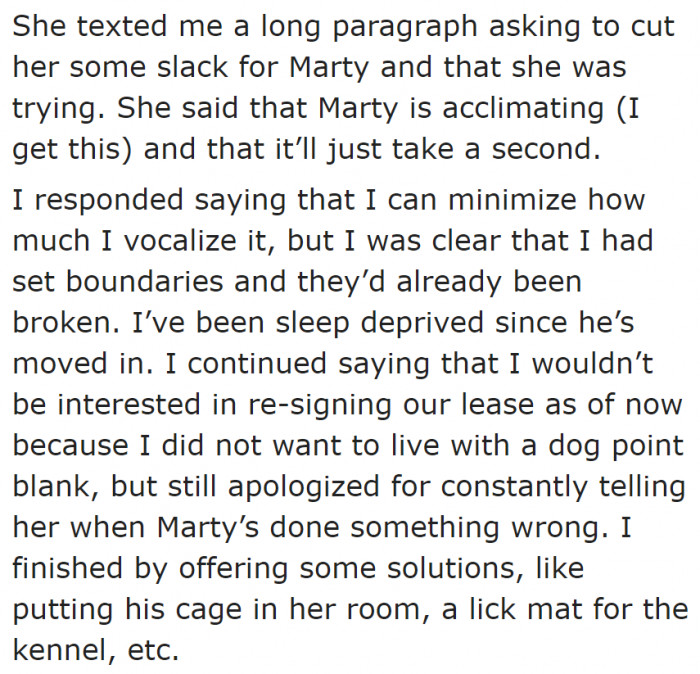
This meeting will probably decide what happens to the dog.

According to one of the Redditors, the OP handled the situation well.
Not only did she agree to a compromise, but she has also been suggesting some solutions. Unfortunately, this roommate is just stubborn.
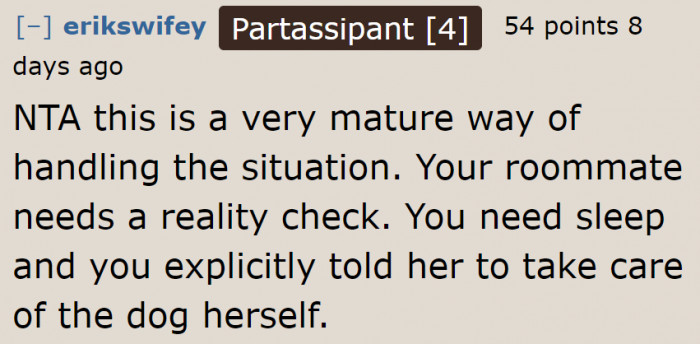
The Role of Responsibility in Co-living Situations
According to research in the Journal of Social Issues, shared responsibilities, like pet care, require explicit communication to avoid misunderstandings.
When one person feels overburdened, it can lead to feelings of victimization and anger, which often manifest in demands for changes, such as removing the pet from the home.
This illustrates the need for clear agreements on household responsibilities to ensure everyone feels valued and respected.
The Impact of Pet Ownership on Relationships
The challenges of sharing pet ownership can significantly impact the dynamics of a living arrangement. Studies show that pets can strengthen bonds between roommates but can also create conflict if responsibilities are not clearly defined. According to research from the University of California, pets often become sources of stress in shared living situations when their care is not equally managed. This highlights the need for open discussions about expectations and responsibilities regarding pet care.
Having regular check-ins can help maintain clarity around these responsibilities and prevent resentment from building.
The roommate needs to place the crate inside her room.

Tenants with pets will likely not get the security deposit back.
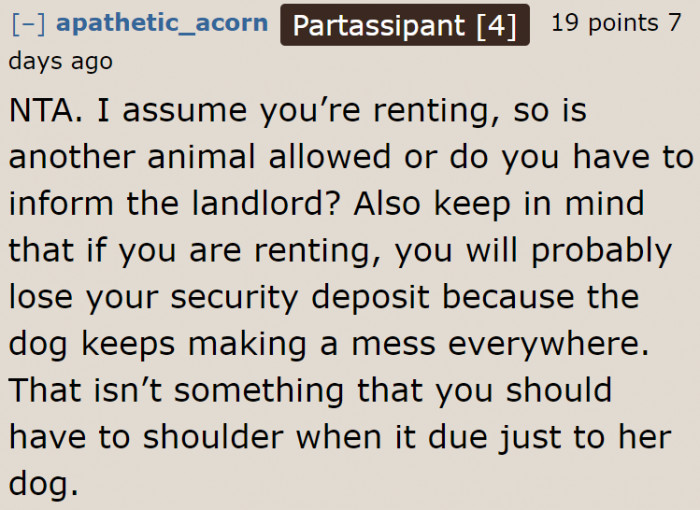
The OP needs to get the other roommate to agree with her.
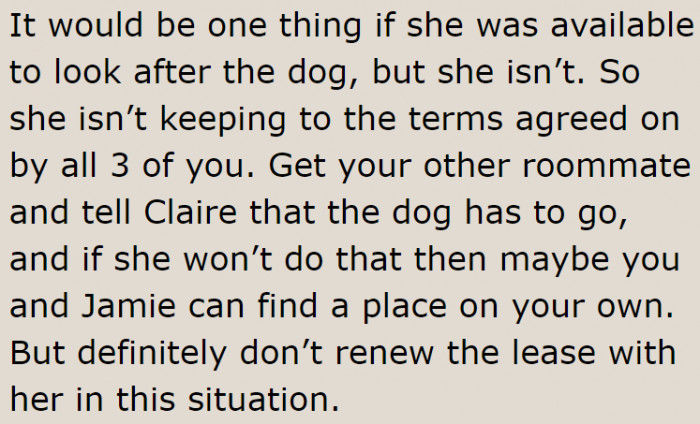
Practical solutions for improving cohabitation include establishing a pet care schedule that outlines each person's responsibilities.
Experts recommend regular check-ins to discuss any concerns or adjustments needed, fostering a sense of teamwork and reducing feelings of isolation.
Creating a shared accountability framework can significantly enhance living conditions and interpersonal harmony.
Additionally, the emotional burden of caring for a pet can lead to stress for the responsible roommate. Research indicates that individuals who take on the majority of pet care may experience increased anxiety and burnout. Implementing a structured schedule for pet care duties can help distribute responsibilities more evenly and create a sense of fairness. As noted by Dr. William Doherty, family therapist, "Clear communication and shared responsibilities are essential in any cohabitation situation to prevent resentment." Furthermore, Dr. Ramani Durvasula, clinical psychologist, emphasizes that "establishing routines can significantly alleviate stress and foster a more harmonious living environment."
Apparently, the landlord allows pets in their place.

The roommate needs to do something about the dog. She can't inconvenience her roommates further.

The trial period needs to end soon.

Understanding Emotional Reactions to Stress
Research emphasizes that stress can significantly alter emotional responses, making individuals more reactive in high-pressure situations.
Studies show that when people perceive their needs are not being met, they may lash out or withdraw, further complicating relationship dynamics.
Recognizing these emotional triggers can help individuals approach conflicts with greater empathy and understanding.
Practical Solutions for Shared Pet Care
To resolve the current conflict, establishing a clear and written agreement regarding pet care responsibilities is essential. This should outline specific duties and expectations for both roommates, fostering accountability and reducing the likelihood of misunderstandings. Research supports that written agreements can significantly improve compliance and satisfaction in shared living situations.
Moreover, involving a neutral third party, such as a mediator, can help facilitate discussions and ensure that both roommates feel heard and respected in the process.
The roommate has been overstepping her boundaries.

The OP already did her part. It's the roommate's turn to do hers.

Maybe rehoming the dog is the best option.

Developing emotional regulation skills can empower individuals to manage their responses more effectively in stressful situations.
Experts suggest mindfulness practices as a way to cultivate emotional awareness and self-control, which can lead to more constructive interactions with roommates.
By fostering a culture of open communication and emotional intelligence, roommates can create a more harmonious living environment.
Finally, encouraging open communication is key to resolving issues related to shared pet care. Regularly scheduled meetings can provide a platform for both roommates to express concerns and negotiate responsibilities. This proactive approach aligns with findings in organizational psychology that emphasize the importance of communication in maintaining healthy interpersonal relationships.
The OP can always consider moving out.

The OP needs to hold her ground or she'll end up in a situation similar to this Redditor.
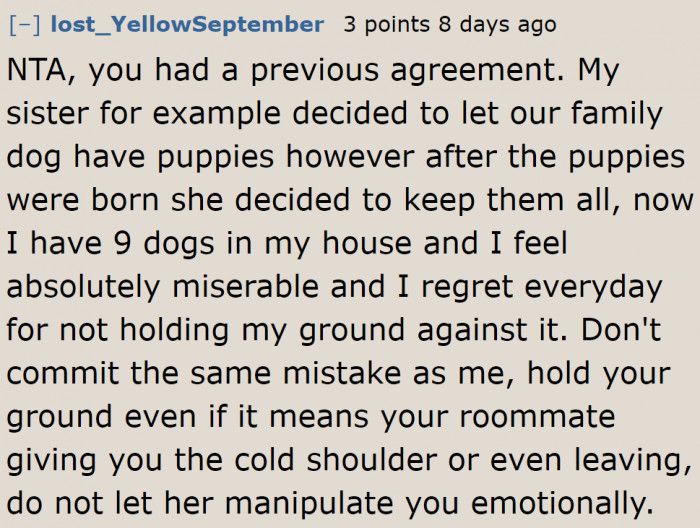
The roommate isn't providing the dog with the extra care it needs.
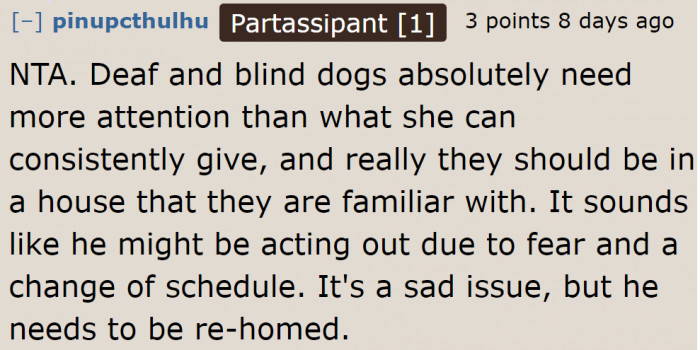
The roommate shouldn't have agreed to take the dog in if she can't care for it properly. If indeed the dog needs to stay with her, she can try talking to her parents to help her find a pet sitter or a dog daycare.
Never be this roommate who thinks she can just put the burden of taking care of her dog on someone else's shoulders.
Psychological Analysis
This situation underscores the complexities that can arise when sharing responsibilities for pet care. It's essential for roommates to communicate openly and establish clear agreements to ensure a fair distribution of responsibilities, ultimately promoting a harmonious living environment.
Analysis generated by AI
Analysis & Alternative Approaches
In summary, addressing the challenges of shared pet ownership requires clear communication, defined responsibilities, and mutual respect. By fostering a collaborative environment, roommates can navigate their differences and create a healthier living situation for both themselves and their pets.
Analysis & Alternative Approaches
This scenario exemplifies the complexities of shared living situations, particularly when pets are involved.
Research supports that addressing interpersonal conflicts with clear communication and shared responsibilities can lead to better outcomes for all parties.
Ultimately, fostering understanding and collaboration can significantly enhance the quality of life in shared households.



